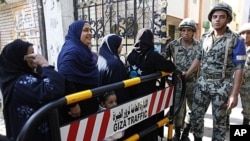The second phase of Egypt's parliamentary elections continued Thursday, with Islamist parties looking to extend their already overwhelming electoral gains.
Egyptians turned out in large numbers during the two days of voting to fill seats in the 498-member lower house of parliament. The turnout was dwindling later Thursday, with small lines forming outside polling stations as the voting neared an end after sunset.
|
Major Alliances for Egypt's Parliamentary Elections Democratic Alliance for Egypt: Formed in June 2011, it was the first significant political coalition to emerge after President Hosni Mubarak's February resignation. The coalition is led by the Muslim Brotherhood's Freedom and Justice Party and includes at least five other political groups. The alliance started out as a broad-based coalition of liberal and Islamist parties but some of its original members left due to ideological differences. Islamist Alliance (Alliance for Egypt): Led by the Salafist party al-Nour and includes at least two other groups. Its members were originally part of the Democratic Alliance but split because of a disagreement over the number of candidates they would be able to field in the elections. The Islamist Alliance formed in late September. Egyptian Bloc: The liberal coalition has lost members since its formation in August and now includes only the Free Egyptians, Social Democratic and al-Tagammu parties. The bloc says it hopes to bring together political forces that are committed to a civil democratic state based on a principle of separation between religion and politics. Completing the Revolution Alliance: Formed in October, the alliance includes youth, socialist, liberal and moderate Islamist parties. Most were formerly part of the Egyptian Bloc. Members include the Revolutionary Youth Coalition, the Egypt Freedom Party and the Socialist Popular Alliance Party. |
Polls are being held in nine areas, including Aswan, Beni Suef, Giza, Ismailia, Suez and Sohag. Nearly 19 million Egyptians were eligible to cast ballots in the second round of the three-phase legislative elections.
The vote appeared peaceful, but groups have reported a few alleged procedural abuses - from parties campaigning at polling stations to officials filling out ballots for voters.
The Muslim Brotherhood's Freedom and Justice Party and the ultraconservative al-Nour Salafi Islamist party, which want Egypt to adhere to the principles of Islamic law, dominated the first round of voting in late November.
A third round of elections covering the remaining nine provinces will take place in early January.
Some in the West are alarmed by the front-running status of Islamist parties. But some Islamists are raising alarms of their own, warning of Western-style freedoms, such as gay marriage, to bring voters to their side in the rural areas.
The parliamentary elections are Egypt's first since a popular uprising ousted long-time President Hosni Mubarak in February.
Elections for parliament's less powerful upper house will begin in late January and finish in March, after which the assembly will write a new constitution.
Some information for this report was provided by AP, AFP and Reuters.
| Join the conversation on our social journalism site - Middle East Voices. Follow our Middle East reports on Twitter and discuss them on our Facebook page. |















